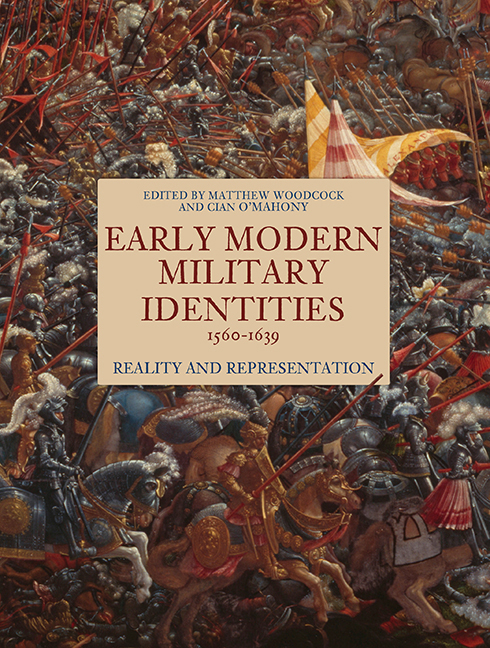Book contents
- Frontmatter
- Contents
- List of Illustrations
- List of Contributors
- Acknowledgments
- List of Abbreviations
- Introduction
- Part I Models of Military Identity
- 1 ‘Warlike prowesse and manly courage’: Martial Conduct and Masculine Identity in Late Tudor and Early Stuart England
- 2 ‘The Breviarie of Soldiers’: Julius Caesar's Commentaries and the Fashioning of Early Modern Military Identity
- 3 ‘Souldiers, or Clarkes, or both’: Ralph Knevet and the Fashioning of Military Identity through Print and Performance in Caroline Norwich
- 4 Thomas, First Lord Fairfax and ‘The Highway to Heidelberg’
- Part II Military Identities in Early odern Ireland
- Part III Staging Military Identities
- Afterword: The Way Ahead
- Bibliography
- Index
2 - ‘The Breviarie of Soldiers’: Julius Caesar's Commentaries and the Fashioning of Early Modern Military Identity
from Part I - Models of Military Identity
Published online by Cambridge University Press: 14 September 2019
- Frontmatter
- Contents
- List of Illustrations
- List of Contributors
- Acknowledgments
- List of Abbreviations
- Introduction
- Part I Models of Military Identity
- 1 ‘Warlike prowesse and manly courage’: Martial Conduct and Masculine Identity in Late Tudor and Early Stuart England
- 2 ‘The Breviarie of Soldiers’: Julius Caesar's Commentaries and the Fashioning of Early Modern Military Identity
- 3 ‘Souldiers, or Clarkes, or both’: Ralph Knevet and the Fashioning of Military Identity through Print and Performance in Caroline Norwich
- 4 Thomas, First Lord Fairfax and ‘The Highway to Heidelberg’
- Part II Military Identities in Early odern Ireland
- Part III Staging Military Identities
- Afterword: The Way Ahead
- Bibliography
- Index
Summary
Julius Caesar's reports of campaigning in northern Europe and during the Roman civil war were widely read and imitated by soldiers, politicians, colonial administrators, historians, writers and soldier-authors throughout the early modern period. But the utility of Caesar's Commentaries in this period extended way beyond the spheres of historical record or, indeed, battlefield tactics. This chapter sets out to demonstrate that the Commentaries had a much wider field of application, and that they represented an influential, authoritative model of military identity in sixteenth- and early seventeenth-century England. My focus here is upon Caesar's twin roles as the text's protagonist and author, and upon the legacy of these paired roles in the Commentaries’ applied reception history. The chapter begins by considering prominent aspects and models of military identity provided both within the text and by Caesar's composition of the Commentaries themselves. It then argues that Caesar's apparent mastery with both pen and sword formed a particularly resonant model of military identity during the early modern period. In particular, I examine how this distinct conception of military identity was translated into English (and England) through successive editions of Sir Clement Edmondes's Observations upon Caesar's Commentaries (1600, 1604, 1609), and how it is epitomised for Edmondes by his friend Sir Francis Vere. This chapter argues that Caesar's Commentaries provided early modern writers, fighters and writing fighters with a vital paradigmatic template for how the arts of the pen and the sword might be productively aligned or synthesised. As will be shown, Caesar's Commentaries constituted a significant resource for both battle-hardened and study-bound polemologists in this period as they returned to perennial questions about how one goes about making a good soldier, and concerning the relative value of martial book-learning and practical personal experience.
Caesar's Commentaries and military identity
Julius Caesar produced seven books of commentarii concerning expeditions made into Gaul, Germany and Britain between 58–52 BC – a text usually known as De Bello Gallico – and a further three books on the civil war (De Bello Civili) waged against Pompey between 49–48 BC.
- Type
- Chapter
- Information
- Early Modern Military Identities, 1560–1639Reality and Representation, pp. 56 - 78Publisher: Boydell & BrewerPrint publication year: 2019



